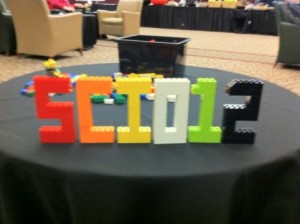
A recurring theme in the sessions I attended at #scio12, and some after hours discussions, was technological infrastructure, and the need to remember that there is a huge digital divide between the haves and the have nots. It’s a problem you expect in developing nations (who we should be communicating with too, not ignoring), but you don’t expect that sort of problem in a country like the United States.
Sadly technological inequality is a huge problem in the United States. In Philadelphia, one of our major metropolitan areas, 40% of the households do not have internet access, in some neighborhoods only about 10% of households have Internet access. That’s at least 230,000 households in without access to the Internet in one city.
As we create activities and resources we need to remember that not all of our students have cell phones, not all students or researchers have Internet access depending on where they are in the US and the world.
A hot button for me is when people assume that all students have laptops and smartphones.? Just because some or even most students have something doesn’t mean that they all do, next time you want to assume something about technology that students have before asking, just don’t. Better yet provide the technology and access if it’s required for a course and not provided more broadly by your educational institution.
The other problem is Infrastructure, while modern cities have tons of infrastructure compared to rural areas in reality our infrastructure is substandard. Don’t believe me? Check out the Report Card for America’s Infrastructure and be prepared to be scared silly by how badly maintained our vital infrastructure has been maintained. Look at those grades, almost all D’s with a few C’s, the nation’s overall grade was a D, let’s think about that, just a little higher than an F for failed infrastructure. (In the 11 years since this blogpost was published the nation’s overall grade has “improved” to a C-). If we can’t even prioritize our water, energy and road safety and maintain them it’s no wonder that we are failing so many people in creating and maintaining our cyberinfrastructure.? The biggest barriers I am seeing to science communication, education, and innovation are a lack of infrastructure and technological inequality.
If you don’t have internet access and electricity it doesn’t matter if someone gives you a computer.
If you don’t have internet access it can be difficult, if not impossible, to apply for a job, to college, for government benefits, file your taxes for free.
Without the tech support, programers, and cutting edge computers many researchers will be limited to what they can do with what they have instead of innovating the future.
Without the ability to easily download, compare, and analyze multiple compounds from the large government databases our ability to find new relationships between these compounds is limited.
I can’t help wondering if our tendency to ignore of basic infrastructure needs is part of why we tend to treat cyberinfrastructure as something we can do later, when things get better, when we have more money, etc.
Disclaimer: I’m biased towards Japan being born there and part Japanese.
I was really impressed by this story about how quickly they repaired a road that was completely destroyed by the tsunami and earthquakes that struck Japan last year. They repaired the road in six days. Road repairs in Lincoln go pretty quickly, especially compared to California but I have to say, I don’t think we have the infrastructure anywhere in the USA to do that much work so quickly after such a huge emergency situation.
So how can we start to address these issues?
The first thing we need to do is admit that they exist and educate ourselves and everyone else that we can about these issues. Infrastructure isn’t just for librarians and scientists and tech geeks, it affects our ability to call for help in an emergency, the safety of our drinking water, and whether the bridges we drive over will bear our weight or collapse.
Once we admit openly and consistently that these problems exist we need to put our money and efforts towards these projects, infrastructure (traditional and cyber) is needed for safety, education, and a connected participatory society. If we don’t fund infrastructure that says that it’s not a necessity it’s a luxury, and that my friends is faulty thinking. Ignoring our infrastructure needs is almost as bad as cutting education funding (I will stay off that soap box for now, no raising the blood pressure before bed).
I don’t have any easy answers but I do know this:
We don’t all need to be on the cutting edge of technology but there is a certain minimal level of access without which it is difficult to fully participate in society. There is a level of IT support & infrastructure without which we will not reach our maximum research potential.
It’s a bit Pollyanna I suppose, but I’d really like to see all of us reach our full potential and we can’t do that without a strong base to stand on.

